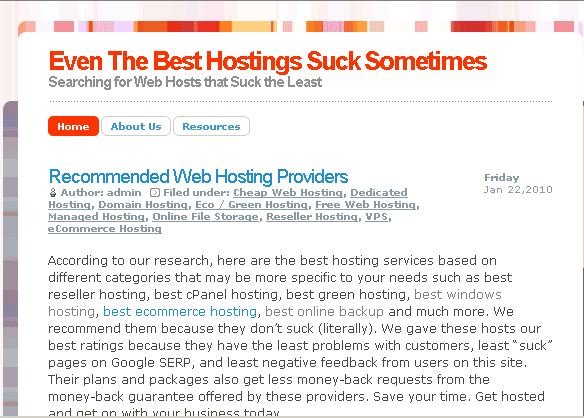
I will never trust hostingsthatsuck.com. Why? Well they at one time had a glowing review of justhost.com. Only to change it to they suck, because they had a lot of negative search engine results. Keep in mind you had to scroll down past the positive review that said “Just Host just sucks, not really” to see a disclaimer that they no longer approved of Just Host and recommend another company, though their Just Host affiliate link and banners remained on the site. Then they changed it back to not sucking because they (hostingsthatsuck.com) finally figured out that people are more likely to post negative comments then they are positive. Took them long enough to figure that out. Considering before that they based their methodology on rather a host sucked or not based on the amount of search engine results for suck with a dot com. But that’s not so much the part that I have an issue with, regardless of the stupidity of their prior methodology. I have an issue with the fact they are in bed with the same people they are supposed to have an unbiased opinion of.
Then there is this:
“admin says:December 29, 2008 at 4:07 pm
Mr Abasi, I hope you don’t take the word “unlimited” to mean infinite. Realistically, it just means that you get enough space more than you ever need or it is an unreachable limit. Read their TOS. If are hosting a file/movie/photo sharing, get a dedicated server!The “abusers” make life of decent users like us harder than it should be, when the web hosts put more and more constraints on what we can do on our hosting account.
We predict that the “unlimited” bytes hard-drive will never be invented, but all web hosting will offer unlimited everything in the future – go figure”
It took another response from Abasi to get the admin to admit that the practice of using unlimited space in sales wording was unethical. Clearly whoever the Admin is, he / she was trying to reinvent the use of the word unlimited. While unlimited has never meant ‘all that you will ever need’, unlimited is a far catchier draw in then ‘all that you will ever need’. How do you determine how much resources that a individual will ever need? A constraint is clearly a limit.
I think the only bigger mess then unlimited hosting is unlimited reseller hosting. Especially when they are reselling webhosting to other customers. Let me tell you the mess that unlimited space reselling can be, or better yet reselling to other resellers. One day I had a customer who moved his site from another host, only to find his previous host shut down his unlimited reseller account because he passed the “all you will ever need” quota. Yes reselling to resellers was allowed. At the same time he did not bother to answer his email or phone to my company’s calls or his customers. His customers found me when they did a whois on his new dns to find my company, thinking we had shut their sites down. We soon shut his account down due the headache it had caused, last time I did the math he cost at least 80 hours of lost man hours between dealing with 47 different individuals that were also reselling. Clearly his $16.99 a month was not going to cover the cost of man power. He obviously was not going to deal with his customers despite the multiple emails and phone calls. Only after shutting his site down did he contact us. Despite pointing his customers to the right company housing their content by doing whois on the dns to their sites, we generated no sales. I was not really eager to guide these people to my company when they were looking for unlimited space, meaning they had the same disaster to look forward to all over again. I tried but when I indicated my company did not offer unlimited, and perhaps it would be best to be with a company that has limits as opposed to being shut down without warning. Their recent downtime did not bring the point home.
Hostingsthatsuck.com does not have those affiliate links and banners on their site for nothing. For the same reasons that webhostingstuff.com has justhost.com on their number 2 spot. I also don’t agree with them on all hosts as offering unlimited in the future. Frankly saying something is unlimited means there is no limits. If the terms of service starts listing limits on space and its usage then they need to remove the “un” from limited. When your website is your source of income you want to make sure you don’t push any limits, or have your limits / needs determined by a webhost… Seriously, if your website is your only source of income, why would you ever trust it to an unlimited account that is $2.95 a month? I suppose you can be cheap and hope that you don’t find out what has been determined to be your needs. Can you afford days of downtime?
Regardless of the so called unlimited false claim, every host has a limit to how much resources a customer can use. Bandwidth can be unmetered, but it will always have a cap on how much data you can send per second. Just as there are limits on how much email you can send out per hour. I reluctantly am willing to say it, but I had one of those unlimited space webhosting companies. It was not something I wanted to do, it came from pressure from a business partner who had started a separate operation. His claim was that it was the future of hosting. But my thoughts were that Dollar Generals, 99 cent stores, and other stores that focus on the cheap had not put Wal-Mart and Target out of business. The unlimited market is simply the cheap market, and no serious website should consider such a service. I consider any one running an unlimited host along the same ethical standards as a payday loan operation.
I got dragged into it when he was drowning in the customer service side. For some reason he thought the level of support and flow of customers would be equal to our other hosting companies where we were charging between $20 – 500 a month. It was going well, and the customers did come flooding in faster than previous operations. But it had been my experience that those that pay you $5 a month require a lot more hand holding then those that pay you a lot. This proved especially true for the unlimited company, which is why I got dragged into help sort it out.
Part of my business partners’ problem was he had long been against my policy of approving orders before setting them up. Unlike the companies we co-found, orders would only be created once they were screened, this was done because I managed customer service. After several fraud orders and charge backs and threats of having his merchant account closed down he quickly come screaming to me to fix it. That and his authorization charges were to the point of eating 90% of his income. I been long screening for a variety of reasons, though charge backs are what started me on screening. Also the credit card industry is not a friend to the businesses that use their merchant services, even worse if you sell a service like webhosting. If you have any doubt of this you have not had a charge back. Credit card companies that offer buyer protection are taking the money straight from the business, in this case my business, often without warning. So you get hit from both the guy committing fraud and your merchant provider. If you’re luckily you have a merchant that does not charge a charge back fee for a third level of pain (it really does pay to read the fine print on those contracts). This happens regardless if the claim is valid or not. Rarely have I been able to win counter claims on charge back claims. So the best way of preventing is to screen every order.
Then the other side of this is a webhost is a hosting company is not going to host every site, even if their intention is not to do a charge back. But screening allowed prevention of those that might violate the terms of service. In my case it was warez, spam, phishing, pornography, hate sites…. (There are so many websites that I wish I had never seen in my 11 years). A unique problem this company had was that every order with a ‘mail’ in their name domain was pretty much signing up to spam. Not something I had encountered with the other hosting companies I had owned.
But the true damage control came in screening existing accounts. When accounts reached 1 gig we started looking for terms of service violations. I would say 20% entered this category at 1 gig. Like those that decided to back up their desktop, back up of their site, any site that was not was not reachable through navigation of their home page, file sharing, etc., etc., etc.. Keep in mind most websites rarely use more than a 100 Megs. When they started reaching 50 gigs it was pretty much a 100% kill rate. Keep in mind part of our terms of service was no reselling, and that all domains must belong to the account holder.
Every account has a magic number with every company for what amounts to a profit threshold. If the account passes by those unpublished limits it surpasses the profit margin the account. Clearly any company that likes money will have such an account in it for the chopping block to ensure they do not running in the negative on income. Otherwise the company becomes a charity. Equipment, advertising, taxes, merchant fees, staff, affiliate payments, web design, utilities, and so much more expenditures are part of making sure a webhosting company runs properly and profitable.












